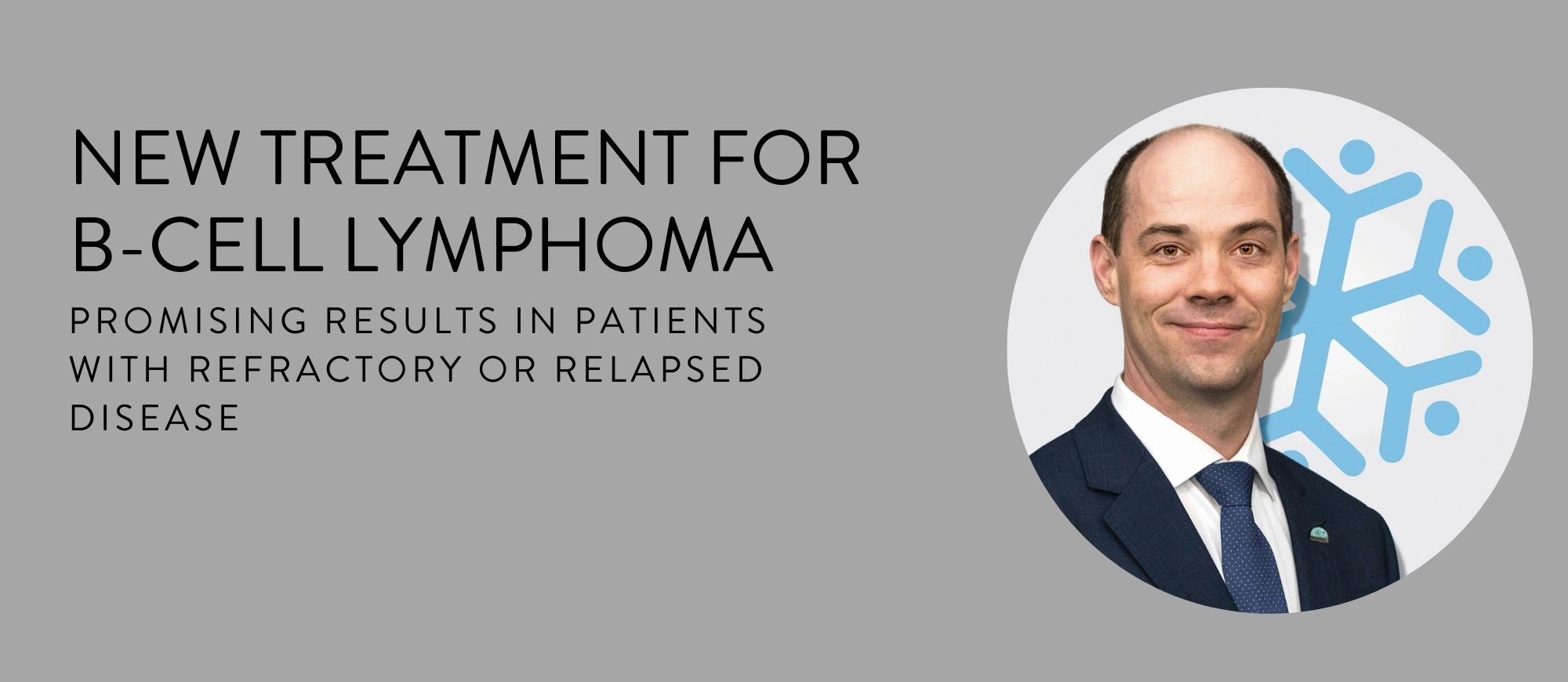New treatment for relapsed or refractory B-cell lymphoma shows great promise

Forty per cent of patients with the most common form of aggressive non-Hodgkin lymphoma (diffuse large B-cell lymphoma) either relapse or are refractory to first line treatment with rituximab and chemotherapy. Stem-cell transplant was the only available treatment option thought to reliably induce cures until the approval of chimeric antigen receptor (CAR) T-cell therapy. However, a new T-cell engaging bispecific antibody known as glofitamab looks very promising. At the higher doses tested in a dose finding trial, B cell lymphoma patients had response rates as high as 65.7% and complete responses of 57.1%!1.
In a new global study, led by A/Prof Michael Dickinson from Peter MacCallum Cancer Centre, glofitamab was tested for the first time in patients with a range of different B-cell lymphomas, who had no other life-extending options available to them. The trial was a dose finding study that set out to not only assess effectiveness but also the best tolerated dose with the maximum benefit.
All patients received pre-treatment with obinutuzumab. Glofitumab is an infusion that was given over two hours every 14 to 21 days. Patients had a median of three prior treatment lines and were refractory to any prior treatment. Glofitamab was effective at all doses and across all histologies of B-cell lymphoma but increased in effectiveness with increasing dose. Overall response rate to treatment in the cohort of patients with aggressive B-cell non-Hodgkin lymphoma was 48% with 33% of patients achieving complete remission1. At the higher dose of ³10 mg the overall response rate was 61% with a complete response rate of 49%1. Time to complete remission was short with the majority occurring by the third cycle.
Although confirmation in expanded phase II trials is required, the results of this trial suggest that patients with relapsed or refractory B-cell non-Hodgkin lymphoma will soon have a new viable treatment option available. It is difficult to compare the effectiveness of glofitamab to other therapies as they have not been studied in head-to-head trials, however the clinical activity of glofitamab appears as good as or better than currently available treatments including CAR T-cell therapy for B-cell non-Hodgkin lymphoma.
Glofitamab is a more suitable option for patients with rapidly progressing disease because it is an “off the shelf” product that does not require manufacturing, harvesting of cells or bridging therapies. The safety and tolerability of glofitumab is considered manageable. Cytokine release syndrome was the most common adverse event however, the majority of cases were considered milder at grade 1 and 2 level. Neutropenia, pyrexia and thrombocytopenia were the next most common adverse effects related to glofitumab treatment1.
There are currently a number of clinical trials recruiting patients in Australia to assess the effectiveness of glofitamab in patients with relapsed or refractory B-cell non-Hodgkin lymphoma. If you think you might be interested in participating in a trial, the best person to speak with is your treating doctor.
-
Hutchings, M., Morschhauser, F., Iacoboni, G., Carlo-Stella, C., Offner, F. C., Sureda, A., Salles, G., Martínez-Lopez, J., Crump, M., Thomas, D. N., Morcos, P. N., Ferlini, C., Bröske, A.-M. E., Belousov, A., Bacac, M., Dimier, N., Carlile, D. J., Lundberg, L., Perez-Callejo, D., … Dickinson, M. J.. (2021). Glofitamab, a Novel, Bivalent CD20-Targeting T-Cell–Engaging Bispecific Antibody, Induces Durable Complete Remissions in Relapsed or Refractory B-Cell Lymphoma: A Phase I Trial. Journal of Clinical Oncology, JCO.20.03175. https://doi.org/10.1200/jco.20.03175
